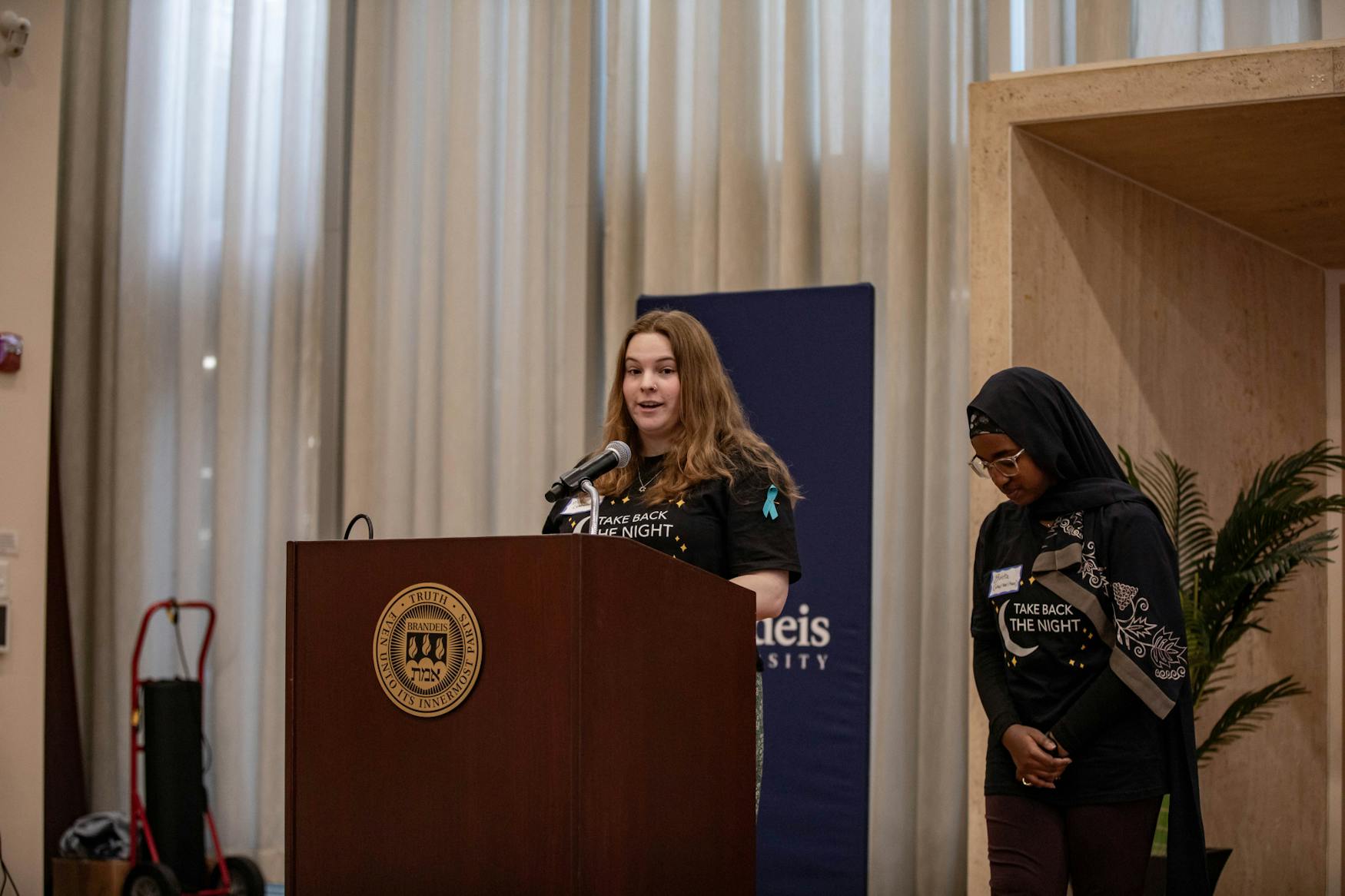Take Back The Night: A march across campus
The annual event included a gathering against sexual violence and a walk through campus to the Lights of Reason.
On April 5 the Prevention, Advocacy and Resource Center at Brandeis University hosted their annual Take Back the Night event to raise awareness about sexual violence during National Sexual Assault Awareness Month.
TBTN is a global movement against sexual assault. According to TBTN’s website, the initiative began in the 1970s when more than 2,000 women representing more than 40 countries gathered at a Tribunal Council meeting in Belgium. The name ‘Take Back the Night’ refers to when women in the 1970s stood up and advocated for the “essential right of women to walk alone at night without fear of being raped, harassed, or otherwise harmed.” TBTN events have historically included marches, rallies and protests in support of ending sexual violence in all of it’s forms. TBTN’s official mission is inclusive and welcoming in nature, aiming to “unite people from every background, belief and culture around the world to take a visible and vocal stand.” A group of around 10 committee members, along with large support from PARC, helped bring TBTN’s mission to the Brandeis community.
At 6:00pm. students gathered in Rapaporte Treasure Halin Goldfarb Library. Committee members welcomed students at the door and provided attendees with snacks, water and free shirts. Upon arriving at the event, participants were encouraged to write a word that came to mind on a candle.
The event commenced with an introduction, an explanation of the history behind TBTN and a moment of silence. Speakers then transitioned to sharing poetry and quotes by survivors, including the two poems “They Think They Win” by Richard Dodd and “Gaps” by Abigail, as well as a piece by Aaminah Shakur called “It Wasn’t Your Fault.” All pieces spoke to the survivor experience, allowing attendees to engage with the purpose of TBTN and contextualize the significance of the event. Due to the sensitive nature of the event, PARC peer advocates and professional staff from Racial Equity Action Challenge at Heller were present and were easily recognizable via name tags and glow stick necklace. Priya Sashiti ’24 — PARC’s peer advocate and committee member— in her opening remarks, was sure to encourage participants to reach out to these resources, recognizing that “there is no reason too small to reach out about, and no threshold needed to access support.”
After the reading of written pieces from PARC members, a student speaker led participants through a self-care activity involving stress-putty and other anti-stress related objects that were handed out at the beginning of the event. Participants were encouraged to close their eyes if comfortable, focus on breathing and asked to shift their attention to particular sensations such as the object in their hands or the clothes touching their skin. With this practice, the event leaders sought to ground participants in a moment of mindfulness and bring awareness to the present. At the end of the activity, attendees were given a moment to reorient themselves. Speakers then ended the initial gathering with closing remarks and gave further instructions for the march through campus which would conclude the event.
A group of 21 attendees accumulated at the back door of the Rapaporte Treasure Hall, donning signs in solidarity with sexual violence survivors as well as lit electric candles. A few of the signs read “Consent is not Sexy, it’s Mandatory,” “We Support Survivors of Sexual Violence” and “Shatter the Silence, Stop the Violence.”
At around 6:40 p.m., the march through campus began. The group moved quietly down the hill towards the Shapiro Science Center, around the SCC and finished at the Lights of Reason. Participants in the march were asked by one of the committee members to “move in a peaceful and quiet manner” because “in doing so, we foster a sense of reflection, community and safety in reclaiming the night, while also being mindful of those who may be intentionally avoiding this event for any reason.” A golf cart was stationed at the Lights of Reason to aid in the walk back to main campus as an accessibility support for attendees. At 6:45 p.m., the event concluded, and participants were reminded to take care of themselves as they dispersed.
In previous years, the Brandeis TBTN event was characterized by a similar march through campus where students could take moments of self-care and reflection at stops along the way. TBTN had a new format this year: attendees first gathered indoors to reflect and listen to speakers before the march began. “This year, we wanted to do something different of having a space before the march that felt more private,” said Sashiti in a post-event interview with The Justice. Elaborating on the changes, she said, “A little bit more of, like, building a community before we went out and marched.”
Maya Ungar ’25, a Peer Advocate on the PARC team, reflected on the event in a post-event interview with The Justice, remarking, “I was very happy with how it turned out.” She spoke to this year’s specific changes, saying, “we focused this year on the space before the march and the written word like poems, paragraphs, and testimonies.” TBTN allowed students to actively take the night back into their own power as they marched through campus in a stand against sexual violence. In future years, the annual TBTN event will continue to evolve for an increasingly inclusive and impactful experience for the Brandeis community.
—Editor’s note: The Justice associate editor Julia Hardy ’25 is a violence prevention educator at the Prevention, Advocacy & Resource Center, and did not contribute to or edit the parts of this article.
— Editor’s note: The Justice senior editor Smiley Huynh '24 contributed to the reporting for this article.




Please note All comments are eligible for publication in The Justice.